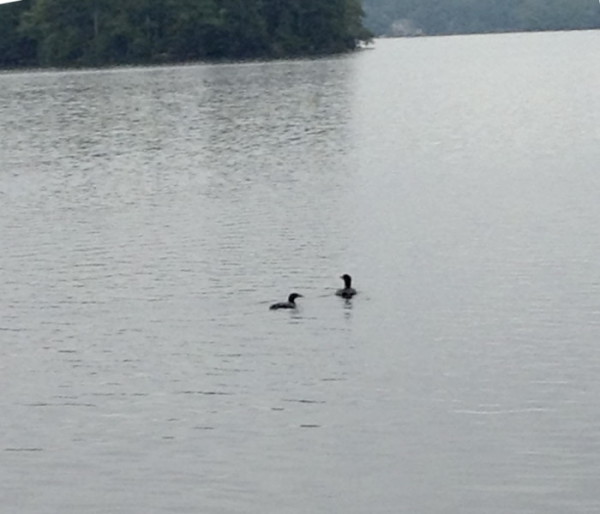What is it about loons that fascinate people? Most would say its haunting call. But there is so much more.
We have been fortunate this summer to witness the birth and growth of a baby loon on Lake Cobbossee. We discovered the nest while kayaking near a small island directly out from our cabin. We watched from a distance for a week or so. And then one day in mid-June, this tiny ball of down was swimming with its parent.
From then on, we were lucky enough to observe the early life of a loon because our cove seemed to be the family’s fishing ground. (I believe it is the sound of our loon clock that attracts them).
Each day, the two parents and baby would cruise along the cove. When it was still very young, the baby would frequently ride on what we assumed was the mother’s back only to swim off when food arrived. The adult loons would dive and bring up edibles to feed to the baby. Both parents participated, but one always stayed with the chick. If something got too close, an adult would rise up, flap its wings and emit one of its piercing tremolos.
Hearing that, we would immediately look to make sure the baby was there. Unfortunately, in past years, young loons have gone missing.
Throughout the summer, the baby loon grew by leaps and bounds. Watching it learn how to dive and fish was a lesson in perseverance (and pretty funny, too). While very young and little, all the loon could do was bob up and down. It never was able to go under, probably because it was too buoyant. But it wasn’t long before it was big enough to dive. Even so, one parent was always nearby, and both adults continued to feed the youngster.
By late August, the baby was almost as big as its parents. It didn’t yet have their beautiful coloring, but it swam, dove and made some of the characteristic loon sounds that we all love.
Even at this late stage, the parents still brought small fish to their adolescent every day, although they began to stray farther away to give it more freedom. They are a couple for life dedicated to raising their offspring — a lesson for us all.
At night, we can sit on the porch and listen to them calling back and forth. For more than two months, the parents have fed, protected and taught their offspring, and now it is almost time to leave — both for us and the loons. We all will go south for the winter, only to return next summer to share the lake again.
Sue King and her husband were teachers in the Washington, D.C., area before they retired to Florida in 2000. They have been coming to Lake Cobbossee for 46 years, finally buying property there in 1982.
Send questions/comments to the editors.




Success. Please wait for the page to reload. If the page does not reload within 5 seconds, please refresh the page.
Enter your email and password to access comments.
Hi, to comment on stories you must . This profile is in addition to your subscription and website login.
Already have a commenting profile? .
Invalid username/password.
Please check your email to confirm and complete your registration.
Only subscribers are eligible to post comments. Please subscribe or login first for digital access. Here’s why.
Use the form below to reset your password. When you've submitted your account email, we will send an email with a reset code.